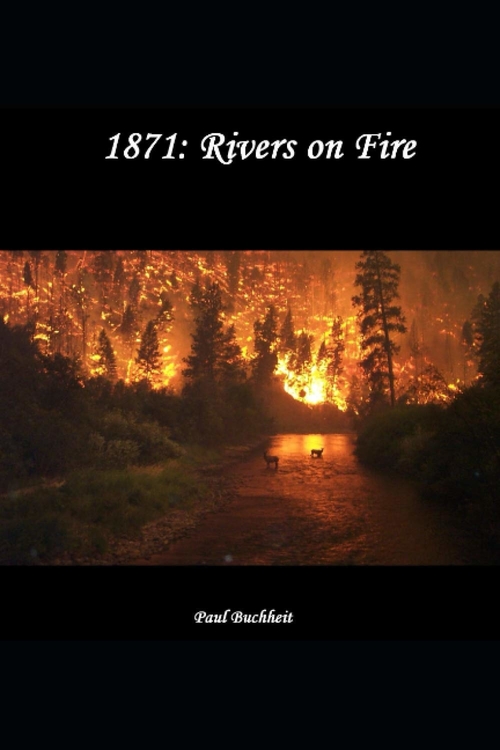
Danger, adventure, romance, and sweeping social commentary are all part of the dramatic meld in the novel 1871: Rivers on Fire by progressive author and thinker Paul Buchheit.
Liz and Robert meet in London where both will study neurobiology, overseen by Dr. Alexander Bain, a pioneer in the exploration of thought patterns. Liz is American, drawn to education overseas because of better prospects for females in academia. Robert is involved in the science of conservation, especially forest depletion.
They soon find common ground in intellectual pursuits, especially the realm of word cognition. They also hold similar views regarding social justice, observing for example, the poor, often harsh treatment of the Irish and other immigrants. They marry, happily, just as their separate researches lead them to be selected to attend a special conference at the University of Chicago.
Two weeks of train travel in the US provides deep insight as the nation, in 1871, is greatly polarized, parts of it still in wilderness and almost every region showing some aspect of social and racial division. In the far west it is discrimination against the Chinese, in the west, against the native peoples, and most everywhere, against black former slaves. Returning to Chicago, they find their role in the conference has been subverted, and their stash of money stolen. Robert takes a logging job in Peshtigo, in the Wisconsin wilderness, while Liz remains in Chicago trying to recoup her rightful academic position. Soon both will be trapped in a fiery conflagration, the voracious flames making good use of careless tree cuttings in the country and the crude housing of the poor in the city.
One fascinating element of Buchheit’s highly complex tapestry is the injection of real people, such as Dr. Bain, into the mix. Liz and Robert will meet or have direct knowledge of such figures as John Muir, Stephen Douglas, Nathan Bedford Forrest, and Jacob Riis, to name only a few of the well known characters that Buchheit conscientiously lists for the reader’s further investigation. In getting to know more about these people, the couple is sometimes surprised at the social attitudes that have been expressed by otherwise admirable icons. Even among the intellectual elites, those they expected to be more socially sensitive, they discover racism and class distinctions, which is eye-opening and troubling for both the characters and the reader.
The two protagonists’ personalities stand in opposition to these skewed values: one of Liz’s best friends in London is a secretary who introduces the two to the more dingy, desperate haunts of London, while Robert is an avowed advocate for engaging with and helping to uplift the poor and downtrodden. Expressing these qualities is evidence of the author’s own ideals. Infusing such high principles into the account of the most devastating fire in American history is nothing short of genius, and accomplished without being overly blunt or heavy-handed.
What readers will find in Buchheit’s elaborately conceived, assiduously researched work are enticing clues to follow regarding our American heritage – both the hidden agenda of racial and social inequality that has marred it, and the courage of those who spoke, and continue to speak and act, against injustice.
Book Links
STAR RATING
Design
Content
Editing
Get an Editorial Review | Get Amazon Sales & Reviews | Get Edited | Publish Your Book | Enter the SPR Book Awards | Other Marketing Services























Leave A Comment